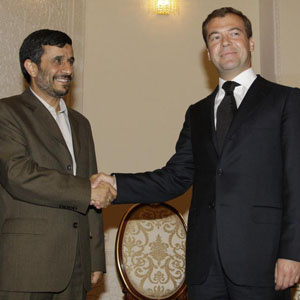Why Are Russians Supporting Nuclear Sanctions?
By Bahram Amir Ahmadian, Russian affairs analyst

Talking in Munich annual security conference, Russian Deputy Prime Minister Sergei Ivanov said that possible sanctions in future should only focus on stopping nuclear proliferation, not the Iranian economy.
In the gap between Geneva talks and Iran’s response to West’s nuclear proposal, Russians’ remarks demonstrated how hopeful there were that Iran would adhere to Geneva agreement. Moscow’s official stance, that is support for negotiations which lead to a diplomatic solution, has not changed since then.
Kremlin, however, has recently toned down its opposition to more stringent sanctions against Iran, and with Tehran’s decision to process high-enriched uranium inside the country, it is gradually declining towards the Western camp.
Moscow’s emphasis on redirection of the target of sanctions from the economic field to nuclear has two likely reasons: first, to make Iranians believe that Russia does not want to see them in a plight; and second, to keep Iran’s lucrative market, although the trade volume between Tehran and Moscow is insignificant compared with exchanges between Tehran and Beijing.
Why is Iran so important for Moscow? The basic answer is that it guarantees that no hostile state will be established in Russia’s southern borders. Any undesirable development in Caucasia -the buffer zone between Iran and Russia, such as the expansion of NATO towards Caucasian states will be a concern for Kremlin, as it makes connection between Tehran and Moscow difficult.
When it comes to the possibility of an unfriendly state or power established in its southern borders, Russia becomes quite squeamish. Thus, it avoids getting into a path which could deprive it from Iran’s friendship and consequently, its strategic depth. Ivanov’s wish for focus of sanctions on Iran’s nuclear technology is evidence of Kremlin’s unwillingness to see Iran advance in nuclear know-how. That a nuclear power should not rise in southern borders, is a principle in Moscow’s diplomatic road map. Focus of sanctions on nuclear technology will serve a dual purpose for the Russians: while it stops Iran short of becoming a nuclear power, it saves Iran’s market for the Russians and shows Iranians that their northern neighbor is not willing to see them under further economic pressure. Sergei Ivanov’s remarks were a good proof to Russian’s foresightedness and teach us a lesson that how we should act based on national interests.
In the gap between Geneva talks and Iran’s response to West’s nuclear proposal, Russians’ remarks demonstrated how hopeful there were that Iran would adhere to Geneva agreement. Moscow’s official stance, that is support for negotiations which lead to a diplomatic solution, has not changed since then.
Kremlin, however, has recently toned down its opposition to more stringent sanctions against Iran, and with Tehran’s decision to process high-enriched uranium inside the country, it is gradually declining towards the Western camp.
Moscow’s emphasis on redirection of the target of sanctions from the economic field to nuclear has two likely reasons: first, to make Iranians believe that Russia does not want to see them in a plight; and second, to keep Iran’s lucrative market, although the trade volume between Tehran and Moscow is insignificant compared with exchanges between Tehran and Beijing.
Why is Iran so important for Moscow? The basic answer is that it guarantees that no hostile state will be established in Russia’s southern borders. Any undesirable development in Caucasia -the buffer zone between Iran and Russia, such as the expansion of NATO towards Caucasian states will be a concern for Kremlin, as it makes connection between Tehran and Moscow difficult.
When it comes to the possibility of an unfriendly state or power established in its southern borders, Russia becomes quite squeamish. Thus, it avoids getting into a path which could deprive it from Iran’s friendship and consequently, its strategic depth. Ivanov’s wish for focus of sanctions on Iran’s nuclear technology is evidence of Kremlin’s unwillingness to see Iran advance in nuclear know-how. That a nuclear power should not rise in southern borders, is a principle in Moscow’s diplomatic road map. Focus of sanctions on nuclear technology will serve a dual purpose for the Russians: while it stops Iran short of becoming a nuclear power, it saves Iran’s market for the Russians and shows Iranians that their northern neighbor is not willing to see them under further economic pressure. Sergei Ivanov’s remarks were a good proof to Russian’s foresightedness and teach us a lesson that how we should act based on national interests.

